(Press-News.org) For decades, there has been great interest in whether omega-3 fatty acids can lower rates of cardiovascular events. In 2018, results from the Reduction of Cardiovascular Events with Icosapent Ethyl-Intervention Trial (REDUCE-IT) were published in the New England Journal of Medicine and showed that a high dose of a purified ethyl ester of eicosapentaenoic acid (EPA) in patients at elevated cardiac risk significantly reduced cardiovascular events. Results from the trial led to US. Food and Drug Administration, Health Canada, and European Medicines Agency approval of the prescription drug icosapent ethyl for reducing cardiovascular risk in patients with elevated triglycerides, as well as updates to worldwide guidelines. But prior and subsequent studies of omega-3 fatty acid supplements that combine EPA and docosahexaenoic acid (DHA) have had mixed results. Investigators from Brigham and Women's Hospital and elsewhere conducted a systematic review and meta-analysis of 38 randomized controlled trials of omega-3 fatty acids. Overall, they found that omega-3 fatty acids improved cardiovascular outcomes. Results, now published in eClinical Medicine, showed a significantly greater reduction in cardiovascular risk in studies of EPA alone rather than EPA+DHA supplements.
"REDUCE-IT has ushered in a new era in cardiovascular prevention," said senior author Deepak L. Bhatt, MD, MPH, the executive director of Interventional Cardiovascular Programs at the Brigham and lead investigator of the REDUCE-IT trial. "REDUCE-IT was the largest and most rigorous contemporary trial of EPA, but there have been other ones as well. Now, we can see that the totality of evidence supports a robust and consistent benefit of EPA."
Bhatt and colleagues performed a meta-analysis of 38 randomized clinical trials of omega-3 fatty acids, including trials of EPA monotherapy and EPA+DHA therapy. In total, these trials included more than 149,000 participants. They evaluated key cardiovascular outcomes, including cardiovascular mortality, non-fatal cardiovascular outcomes, bleeding, and atrial fibrillation. Overall, omega-3 fatty acids reduced cardiovascular mortality and improved cardiovascular outcomes. The trials of EPA showed higher relative reductions in cardiovascular outcomes compared to those of EPA+DHA.
The researchers note that there are crucial biological differences between EPA and DHA -- while both are considered omega-3 fatty acids, they have different chemical properties that influence their stability and strength of the effect that they can have on cholesterol molecules and cell membranes. No trials to date have studied the effects of DHA alone on cardiovascular outcomes.
"This meta-analysis provides reassurance about the role of omega-3 fatty acids, specifically prescription EPA," said Bhatt. "It should encourage investigators to explore further the cardiovascular effects of EPA across different clinical settings."
INFORMATION:
REDUCE-IT was sponsored by Amarin. Brigham and Women's Hospital receives research funding from Amarin for the work Bhatt did as the trial chair and as the international principal investigator. The present analysis was unfunded.
Paper cited: Khan SU et al. "Effect of Omega-3 Fatty Acids on Cardiovascular Outcomes: A Systematic Review and Meta-Analysis" eClinical Medicine DOI: 10.1016/j.eclinm.2021.100997
Myocarditis-or inflammation around the heart--has been reported in some patients with COVID-19. After searching the medical literature, researchers have now summarized the results of 41 studies describing myocarditis in 42 patients with COVID-19.
The analysis, which is published in the END ...
In women in their mid-40s to early 50s, endometriosis--a condition in which tissue that normally lines the uterus grows outside the uterus--was linked with poor work ability and more sick days, but not with unemployment or early retirement.
The findings, which are published in END ...
Physical relaxation through yoga or other practices can help reduce work-related stress, according to an analysis of studies conducted in healthcare staff.
The analysis, which is published in the END ...
Students reported far higher rates of bullying at school before the COVID-19 pandemic than during the pandemic across all forms of bullying--general, physical, verbal, and social--except for cyber bullying, where differences in rates were less pronounced. The findings come from a study published in END ...
A new analysis called an evidence and gap map has mapped what we know about improving the functional ability of older adults living at home or in nursing homes, retirement homes, or other long-term care facilities.
A total of 548 studies were included in the map, which is published in END ...
We're currently living in what many scientists are calling the Anthropocene, the period during which human activity has been the dominant influence on climate and the environment. An article published in the END ...
Experiencing a variety of positive emotions--or emodiversity--may benefit high school students, according to a study published in the END ...
Integrated Assessment Models (IAMs) connect trends in future socio-economic and technological development with impacts on the environment, such as global climate change. Critics have taken issue with the transparency of IAM methods and assumptions as well as the transparency of assessments of IAMs by the Intergovernmental Panel on Climate Change (IPCC), the United Nations body for assessing the science related to climate change.
An article published in END ...
ANN ARBOR, Mich. - The number of adolescents admitted to the hospital for severe illness from eating disorders has increased significantly during the COVID-19 pandemic, new research suggests.
At one center, the number of hospital admissions among adolescents with eating disorders more than doubled during the first 12 months of the pandemic, according to the study that appears in a pre-publication of Pediatrics.
The 125 hospitalizations among patients ages 10-23 at Michigan Medicine in those 12 months reflect a significant increase over previous years, as admissions related to eating disorders ...
Using single cell technology, a new study sheds light on the significance of genetic risk factors for, and the diversity of cells involved in, the development of coronary artery disease. The researchers analysed human atherosclerotic lesions to map the chromatin accessibility of more than 7,000 cells. The chromatin accessibility is known to reflect active regions and genes in the genome. The findings were published in Circulation Research.
Genome-wide association studies of the human genome have identified over 200 loci associated with coronary artery disease. More than 90% of them ...
